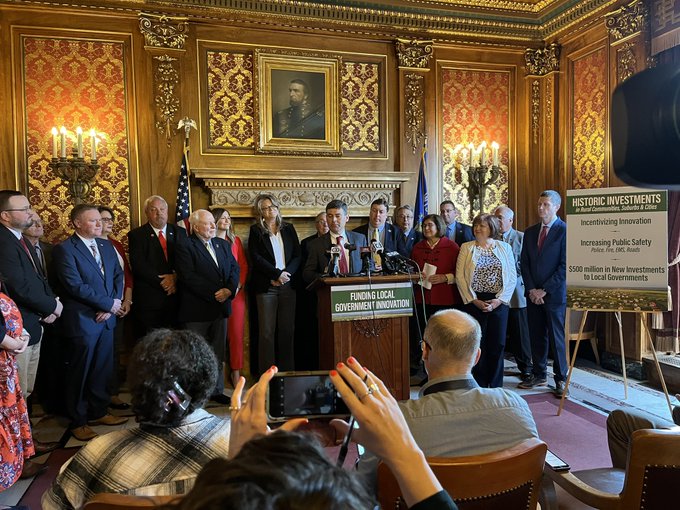
Dan O’Donnell explains why the new Republican shared revenue plan is a godsend for cash-strapped cities like Milwaukee—because it saves them from their own worst impulses.
May 3, 2023
Perspective by Dan O’Donnell
The only two certainties in life are death and taxes, sure, but in Wisconsin there is a third: Local governments complaining about tax revenue. Specifically, they aren’t getting enough of it from the state.
Just last week, the City of Milwaukee had its various departments project what a 25% budget cut would look like if it can’t close a projected $156 million budget deficit next year. The Milwaukee Police Department, naturally, would be the hardest hit, with an estimated $75 million in cuts, 400 lost positions, and even the potential closure of an entire District station.
Literally the same day, though, Milwaukee also unveiled its “Connec+ing MKE: Downtown Plan 2040” plan, which would invest untold hundreds of millions in tearing down the I-794 Lake Interchange, redeveloping the Milwaukee Public Museum building and Marcus Center parking garage, and, of course, dramatically expanding The Hop streetcar system.
This is the municipal equivalent of a friend asking for a loan to make rent for the month and then showing up the next day with a new tattoo sleeve.
Such hilariously ruinous financial planning is why the Republican Legislature’s plan for increasing shared revenue to cities like Milwaukee is such a prudent one. Rather than allowing local governments to spend the utility money on a new Louis Vuitton purse, the proposal will force the worst offenders—especially Milwaukee—to spend only on what it says it needs.
It also curtails left-leaning municipal leaders’ tendencies toward idiotic wokeness and iron-fisted tyranny by requiring that law enforcement staffing levels are maintained, racial quotas and preferences are disallowed in hiring and promotion, and quarantines and lockdowns are never again ordered by local public health bureaucrats.
Milwaukee in particular would have to undo much of its “Defund the Police” agenda of the past few years. The Republican bill would transfer a substantial amount of power away from the corrupt and decidedly anti-police Fire and Police Commission, require that Milwaukee Public Schools have a minimum of 25 resource officers in schools at all times, and force the district to report on how many crimes are committed on school grounds or buses.
Oh, and no tax money would be allowed to be used on new tattoos, errrrr, streetcar expansions.
In exchange for essentially forcing Milwaukee into some semblance of fiscal sanity, the Legislature would allow the city to hold a binding referendum on increasing its sales tax by up to 2%. In addition, Milwaukee County could raise its sales tax to 0.875% if voters approve such a move.
But this, too, comes with limitations. The sales tax increases would only be in effect until the city’s and county’s pension obligations—which make up the lion’s share of their debt—are paid off. Once they are, the sales tax increases would instantly be repealed. There could thus be no temptation to keep them in place permanently to pay for all manner of unnecessary boondoggles.
The proposal allocates more than $226 million in new shared revenue to all of Wisconsin’s cities, counties, and villages and allows them to augment their public safety and public works budgets, but it does not give them a blank check.
This is probably why the plan will face Governor Evers’ line-item veto pen. He pledged $576 million in shared revenue as part of his budget proposal and generally likes the idea of local governments overspending on luxury items like streetcars and diversity, equity, and inclusion departments. If local governments, especially Milwaukee, really are as financially strapped as they say they are, then the Republican plan can save them from their own worst, most ruinous impulses.
That’s probably why most of them will oppose it.
